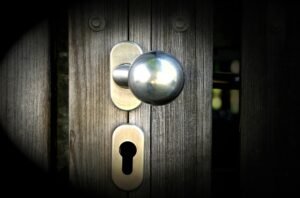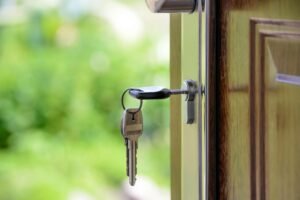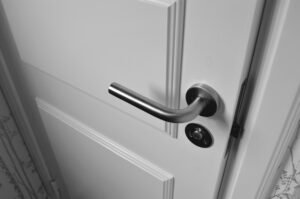How many front door keys should you own and who should you give them to? Not enough and you risk being locked out, too many and you may weaken your security. Read on for more information on which household members should own keys and who you should give one to in case of an emergency. We also make good suggestions for hiding keys for emergencies (and no, it’s not under a flower pot by the front door).
How Many Keys For The Family?
When you move into a new home it’s advisable to fit new locks to your doors. It may seem unlikely but you don’t really know who may have a key to your lock, even if you trust the people you bought the house from. Once you have a new lock fitted, it will probably come with two keys, but is this enough for you? Generally speaking, you want one for each adult plus one spare. Whether you give a key to your child or children is your choice, but remember that they do tend to lose keys, so it’s important not to give them one until it’s necessary. It may be necessary if they frequently get home before you, in which case judge it according to your child… are they likely to lose it? If so, should you consider leaving one for them with a trusted neighbour, family member or indeed in a keycode box?
Who to Leave The Spare With
The spare can be left with a neighbour or family member, but it must be someone you trust implicitly. If you have the choice between a family member who lives a five-minute walk away or your neighbour, it might be worth the walk.
A Keycode Box
If you don’t trust any of your neighbours or don’t feel you know any of them well enough just yet, the best option for your spare is a keycode box. A keycode box also helps for families who have lots of teenagers who can use this key to enter the house rather than have many keys cut. A keycode box, despite being safe, should still be hidden from view, preferably in a nook or cranny. Change the number frequently in case your child tells a friend.
Too Many Keys?
Some families end up with too many keys, this can happen when children leave home or when keys get cut and then old ones are found. You don’t really want too many keys as they can get in the wrong hands. If you do end up with multiple unnecessary keys, store them somewhere safe in your home, along with your passport perhaps, this way should you need it you’ll know where it is. Should someone burgle your home or you happen to let in an undesirable, they won’t be able to easily find and remove them from your property.
Where To Keep Keys
When you’re home, where should you leave your keys? Avoid leaving them in the view from a front window, door or through the letter box. Thieves have clever ways of reaching your keys and despite you being at home, maybe asleep or in the garden, they still may try to access your home using your own keys if they can reach them. After you have locked up at night, place your keys out of view and out of reach. Perhaps in a picture frame key storage or a hook that’s not visible from any window or door.
Managing your household keys is an important way of preventing crime. Make sure you only give them to children who really need them and furthermore only leave them with a neighbour or family member you truly trust. Consider a safe keycode box to store a spare key and keep this out of view. Store spare keys away safely and store in-use keys out of sight.





